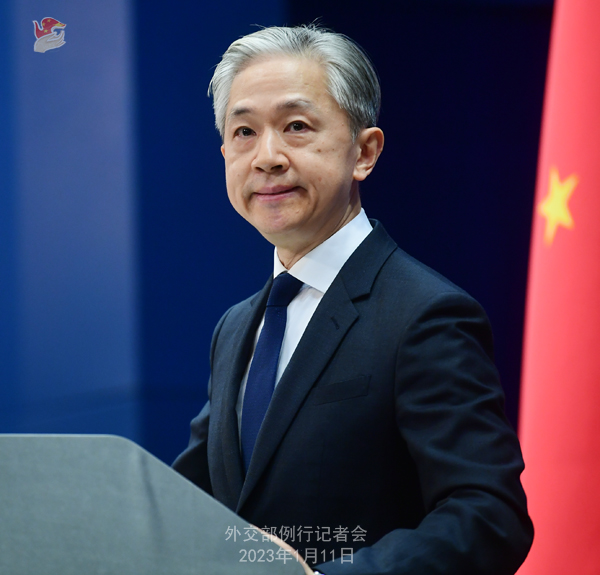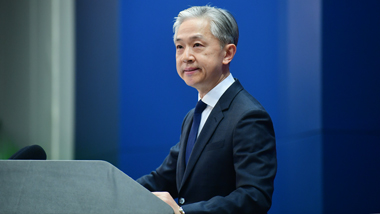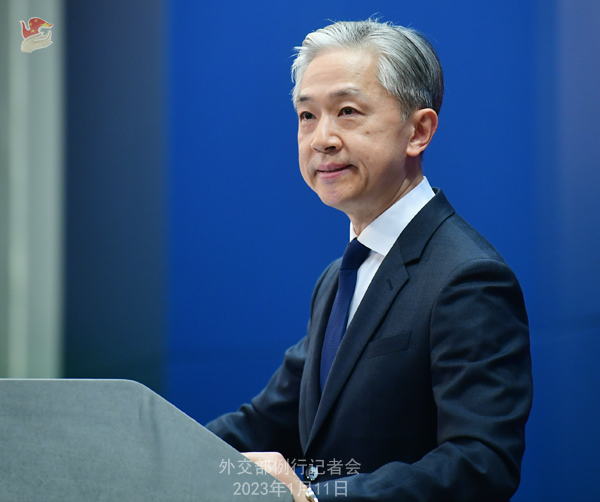
Xinhua News Agency: Foreign Minister Qin Gang is visiting Africa just after assuming his new post. We noticed some of his activities in Ethiopia yesterday. Could you share more information?
Wang Wenbin: On January 10, Foreign Minister Qin Gang arrived in Ethiopia for a seven-day visit to Africa. For 33 years, Chinese foreign ministers have made Africa the destination of their first overseas visits each year. This speaks volumes about the high importance China attaches to growing its traditional friendly relations with Africa.
Ethiopia is a major African country with important influence. It is China’s comprehensive strategic cooperative partner in Africa and an important partner for China-Africa Belt and Road cooperation. Foreign Minister Qin Gang chose the country for his first overseas visit in his new capacity. This speaks to the close friendship between our two countries and the importance China attaches to growing ties with Ethiopia. The visit is aimed at implementing the common understandings on deepening bilateral relations reached by leaders of both countries, consolidating traditional friendship, enhancing political mutual trust, seeking synergy between respective development strategies, advancing cooperation in various areas, and further enriching the China-Ethiopia comprehensive strategic cooperative partnership.
During the visit, Foreign Minister Qin paid a courtesy call on Ethiopian Prime Minister Abiy Ahmed Ali and held talks with Deputy Prime Minister and Foreign Minister Demeke Mekonnen Hassen. The two sides held in-depth exchange of views on bilateral relations and international and regional issues of mutual interest and reached important common understandings. The Chinese side has released readouts on them. Both sides expressed satisfaction with the current state of bilateral ties and confidence in their prospects. Both agree that as major developing countries sharing similar visions and fellow travelers on the path to modernization, China and Ethiopia should be partners that firmly support each other, pursue common development and uphold international fairness and justice. China-Ethiopia relations are embracing new opportunities and bright prospects.
Foreign Minister Qin also shared the progress made under the Outlook on Peace and Development in the Horn of Africa in Ethiopia. He noted that China had put forward the outlook to support countries in the region in seeking strength through unity and achieving prosperity and stability. China supports the convening of the inaugural Horn of Africa peace conference, which contributed to building consensus among all parties and promoting peace and development in the region.
With a view to enhancing cooperation between the two foreign ministries, the two sides signed a memorandum of understanding on political consultation between the two foreign ministries.
AFP: The UK and Japan are expected to sign a major defence deal today. The deal is allowing UK troops to deploy in Japan. This is part of Japan’s efforts to face what they call the challenges posed by China. Does China plan to protest officially to the UK and Japan?
Wang Wenbin: The Asia-Pacific is an anchor for peace and development, not a wrestling ground for geopolitical competition. China is a cooperation partner for all countries and poses no challenge to anyone. The defense cooperation between relevant countries should be conducive to enhancing mutual understanding, trust and cooperation between countries. It should not target any imaginary enemies, still less replicate the obsolete mindset of bloc confrontation in the Asia-Pacific.
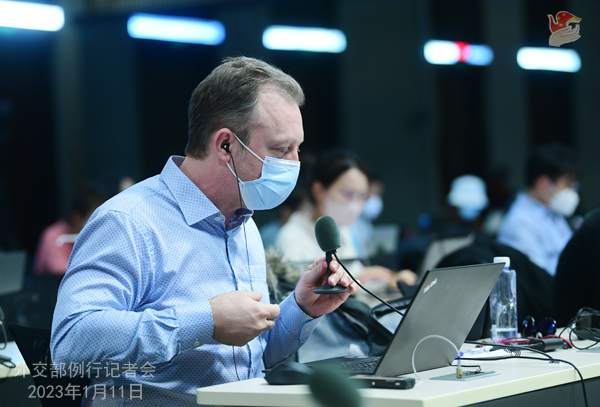
Fuji TV: With regard to the Japan-related restrictive measures issued by China yesterday, the Japanese government has expressed regret. Japan’s measures against China include nucleic acid test and proof of negative result. Those are completely different from China’s measures of suspending issuance of ordinary visas and the measures of the two sides are not reciprocal. What is your comment?
Wang Wenbin: We have pointed out many times that a handful of countries, in disregard of science and their actual epidemic situation, have insisted on taking discriminatory entry restriction measures against travelers arriving from China. China responded to certain countries’ discriminatory action with reciprocal measures. This is to protect our fellow citizens’ legitimate rights and interests and make sure the environment is suitable for normal exchange and cooperation between countries, which is fair and legitimate.
We would like to take this opportunity to share more of the relevant facts with you. Health experts and epidemiologists from many countries have pointed out that tightening entry policy towards travelers from China is neither science-based nor necessary. The Health Minister of Singapore said recently that imported cases from China accounted for less than 5% of Singapore’s total imported infections in the four weeks running up to January 1, which was far lower than the proportions of imported infections from other countries and regions. There is no need to impose new restriction measures against China at the moment. WHO Regional Director for Europe Dr. Hans Henri P. Kluge noted recently that China has been sharing virus sequencing information with the international community; the SARS-CoV-2 virus variants circulating in China are those that have already been seen in Europe and elsewhere; the situation in China is not anticipated to significantly impact the COVID-19 epidemiological situation in Europe at this time; and precautionary travel measures should be rooted in science, proportionate and non-discriminatory. He also said that the new XBB.1.5 recombinant virus has already been spreading rapidly across the US, and that a threat could come from a new variant of concern, anywhere, anytime.
We once again call on relevant countries to make sure that their COVID response measures are fact-based, science-based and proportionate. All parties need to work together to create enabling conditions for normal cross-border travel and people-to-people exchange and cooperation.
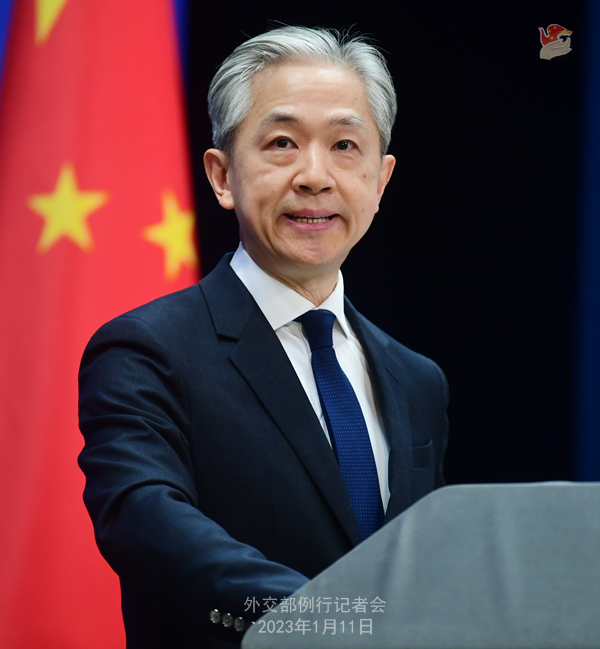
CCTV: Recently many countries have introduced measures welcoming Chinese tourists. Do you have any comment?
Wang Wenbin: Since China announced the decision to manage COVID-19 with measures against Class-B infectious diseases and adopted provisional measures on cross-border travel, many countries have said that they warmly welcome Chinese tourists and will not place entry restrictions on travelers from China. In Thailand, the Deputy Prime Minister and other government officials greeted passengers from China at the airport and gifted them with health bags and garlands. The head of the Tourism Authority of Thailand said in Chinese to the tourists that China and Thailand are one family. The foreign ministry of Maldives said on its official website and Twitter that Maldives welcomes China’s refinement of exit and entry measures and looks forward to receiving Chinese tourists soon. Cambodian Prime Minister Hun Sen expressed the hope of receiving two million Chinese tourists in 2023. Indonesia and other countries have arranged for Chinese-speaking staff to assist in relevant work. Chinese restaurants in travel resorts like Bali that were temporarily closed due to COVID-19 have gradually resumed business. Local travel agencies have launched Spring Festival tours one after another.
Friendly countries with hospitable hosts fill Chinese tourists’ hearts with warmth and happiness and will naturally become favored destinations. There will be efforts to make it easier for Chinese tourists to get to those places including by increasing the number of direct flights. We also remind Chinese travelers to take extra care with their health management and monitoring to make sure they can have a smooth and pleasant trip overseas.
China will continue to adapt its COVID response measures to the evolving epidemic situation and work with all sides to ensure safe, unhindered and orderly cross-border travel and contribute to international solidarity against the pandemic and world economic recovery.
Kyodo News: In response to the restriction measures adopted by the ROK and Japan, China took reciprocal measures. But the US and some European countries also adopted restriction measures targeting China. Why hasn’t China taken reciprocal measures against them?
Wang Wenbin: We have made it clear that China has taken reciprocal measures in response to relevant countries’ actual discriminatory measures against China.
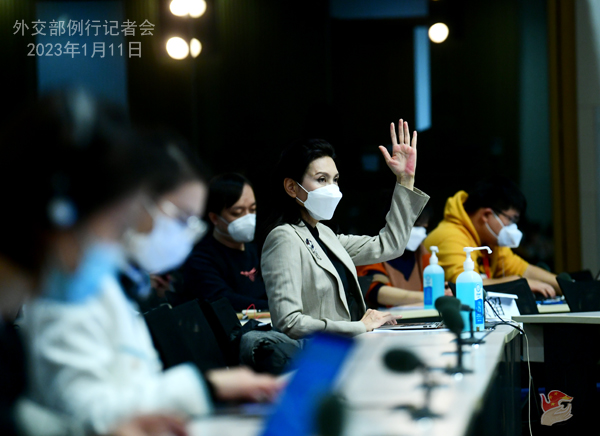
Bloomberg: The Philippine Supreme Court has nullified a 2005 agreement that allowed the Philippines, China and Vietnam to jointly explore for oil resources in the South China Sea. How does this affect the Philippines and China’s plan to restart discussions on oil and gas exploration in that body of water following a meeting between President Marcos and President Xi last week? When does China expect to resume talks with the Philippines on oil and gas exploration in the South China Sea? Is China looking at a definite timeline?
Wang Wenbin: National oil companies from China, the Philippines and Vietnam signed the Tripartite Agreement for Joint Marine Seismic Undertaking in the Agreement Area in the South China Sea in 2005 and conducted joint seismic undertaking in some parts of the South China Sea. It was an important step by the three countries to implement the DOC and a useful experiment for maritime cooperation between parties to the South China Sea. It played an important role in promoting stability, cooperation and development in the region.
China remains committed to properly handling maritime disputes in the South China Sea with countries directly concerned, including the Philippines, through dialogue and consultation, and to actively exploring ways for practical maritime cooperation including joint exploration. During Philippine President Marcos’s recent visit to China, the two sides agreed to bear in mind the spirit of the Memorandum of Understanding on Cooperation on Oil and Gas Development signed in 2018 and resume discussions on oil and gas development at an early date, building upon the outcomes of the previous talks, with a view to benefiting the two countries and their peoples.
Tokyo News: A group of Lithuanian lawmakers are on a visit to Taiwan and will meet with Tsai Ing-wen. What’s your comment?
Wang Wenbin: We have pointed out repeatedly that Lithuania violated its commitment made upon the establishment of diplomatic ties with China and blatantly created the false impression of “one China, one Taiwan” in the world. This contravenes the basic norm governing international relations. We urge Lithuania to abide by its commitment made upon the establishment of diplomatic ties with China and return to the one-China principle as soon as possible.
Bloomberg: The new House of Representatives has set up a committee to come up with ways to what it said was counter China’s growing economic and strategic power. This was a bipartisan committee and it received overwhelming support for its establishment. Does the foreign ministry have a response to this committee being formed?
Wang Wenbin: We hope the relevant US politicians view China and the China-US relations in an objective and reasonable light, proceed from the US’s own interests and the common interests of China and the US, head toward the same direction with China and promote the development of the China-US relations based on mutual respect, peaceful coexistence and win-win cooperation.
Fuji TV: Do you think the restrictive measures Japan and China have taken against each other are reciprocal?
Wang Wenbin: The measures we’ve taken are entirely justified and reasonable. We once again call on relevant countries to follow the principle of science and make sure that their COVID response measures are science-based and proportionate.
